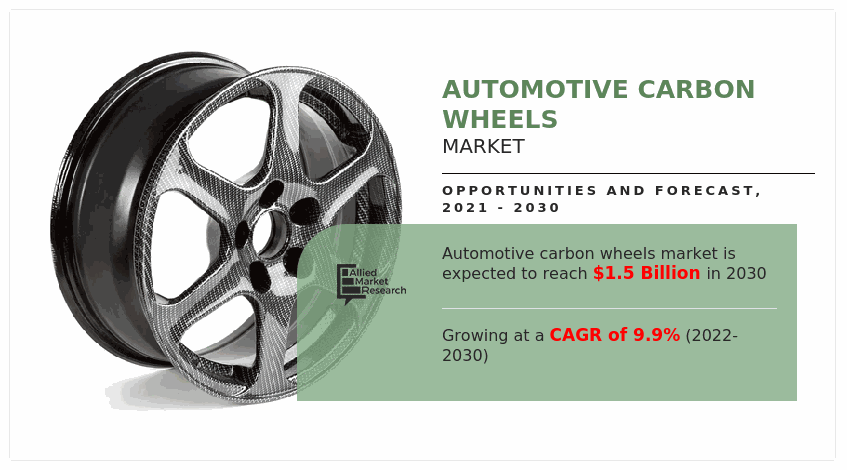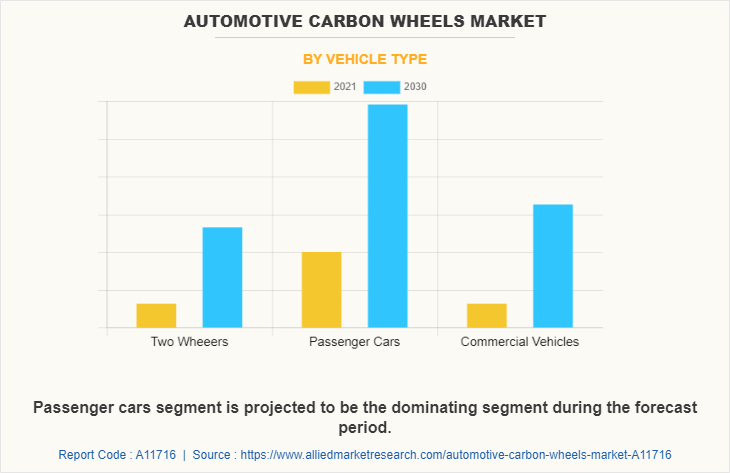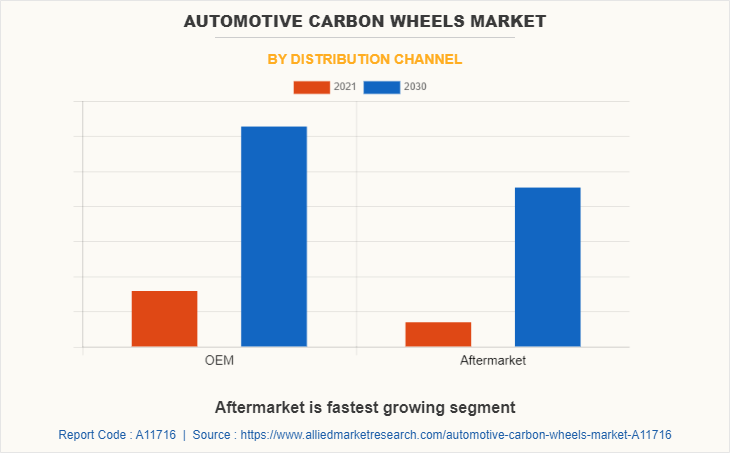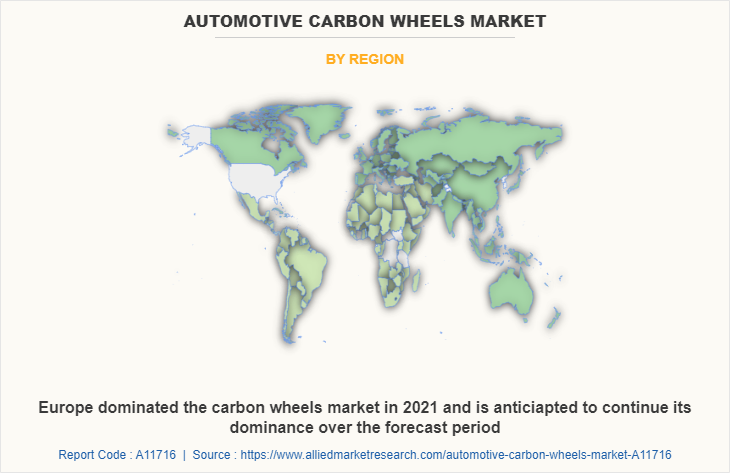Automotive Carbon Wheels Market Research, 2030
The global automotive carbon wheels market was valued at $626.00 million in 2021, and is projected to reach $1.5 billion by 2030, growing at a CAGR of 9.9% from 2022 to 2030.

A wheel is a circular metal frame with spokes or a solid disc attached to a hub. Car tires, also known as rims or alloy wheels, are mounted on a wheel frame. Steel, aluminum, magnesium, carbon fiber, or a combination of these metals are used to make these. Automobile carbon fiber wheels are lightweight, have a long wheel life, and are extremely strong. They also have many other advantages over the traditional wheels, such as elevated fatigue damage strength and durability, self-vibration cushioning, stronger grip, and high heat rigidity.
The need to improve fuel efficiency and reduce vehicle weight are the primary driving factors expected to boost demand for automotive carbon wheels and expand the automotive carbon wheels market size. Vehicle weight reduction, which leads to improved efficiency and performance, is a major concern for automotive players. Reduced wheel weight improves maneuverability, provides a quieter and smoother ride, faster acceleration, faster slowdown, improved suspension, and continued fuel efficiency improvements. All such factors drive the global automotive carbon wheels market.
However, the high initial cost of manufacturing carbon fiber material may limit the growth of the automotive carbon wheels market in the coming years. Furthermore, carbon wheels are only available in a limited number of sizes, and their high cost restricts their application to specific vehicle segments. As a result, the global market for automotive carbon wheels is suffering.
The global automotive carbon wheels market is segmented on the basis of vehicle type, distribution channel, and region. By vehicle type, the market has been divided into passenger cars, commercial vehicles, and two-wheelers. By distribution channel, the analysis has been divided into OEM and aftermarket. By region, the market is analyzed across North America, Europe, Asia-Pacific, and LAMEA.
The key players profiled in this report include Carbon Revolution, Dymag Group Limited, ESE Carbon, ROTOBOX d.o.o., Litespeed Racing LLC, HITACHI METALS, LTD., Phoenix Wheel Company, Inc., Rolko Kohlgrüber GmbH, Thyssenkrupp AG, and Ronal Group.
The automotive carbon wheels market is segmented into Vehicle Type and Distribution Channel.

By vehicle type, the market has been divided into passenger cars, commercial vehicles, and two-wheelers. Among these passenger cars sub-segment is anticipated to have a dominating market share in the forecast period. The rising demand for passenger vehicles in emerging economies such as China and India as a result of economic development has aided the growth of the passenger vehicle sub-segment.

By distribution channel, the market has been divided into OEM and aftermarket. The OEM sub-segment is projected to be most dominating in the global market. The growing emphasis on improving engine power in electric vehicles relative to vehicle weight in both passenger and commercial electric vehicles is contributing to the growth of this sub-segment. The use of carbon wheels is expected to reduce the vehicle's weight and thus aid in increasing the vehicle's power output.

By region, Europe dominated the global automotive carbon wheels market in 2021 and is forecasted to remain the dominant region during the forecast period. The presence of key car manufacturers in the Europe region such as Porsche, BMW, Ferrari, Mercedes-Benz, Audi and Lamborghini that use carbon fiber composite material in their vehicles, as well as a strong emphasis on materials engineering for developing light automotive composite materials such as carbon fiber automotive rims and wheels, are expected to aid the growth of the carbon wheels market in the Europe region during the forecast period.
IMPACT OF COVID-19 ON THE GLOBAL AUTOMOTIVE CARBON WHEELS MARKET
- The Covid-19 has had a negative impact on the market for automotive carbon wheels. The global decrease in automotive sales in 2020 due to pandemic lockdowns and restrictions has had a significant impact on global sales of automotive carbon wheels.
- Disruptions in international supply chains for essential components used in automotive carbon wheels, such as semiconductors, impacted the global automotive carbon wheels market size during the pandemic.
- The temporary closure of manufacturing facilities to limit the spread of the COVID-19 virus will reduce industry demand. Manufacturing costs, on the other hand, will remain a major constraint on industry profitability and economic feasibility, as will innovations to improve performance while reducing vehicle weight for improved fuel efficiency.
Key Benefits For Stakeholders
- This report provides a quantitative analysis of the market segments, current trends, estimations, and dynamics of the automotive carbon wheels market analysis from 2021 to 2030 to identify the prevailing automotive carbon wheels market opportunities.
- The market research is offered along with information related to key drivers, restraints, and opportunities.
- Porter's five forces analysis highlights the potency of buyers and suppliers to enable stakeholders make profit-oriented business decisions and strengthen their supplier-buyer network.
- In-depth analysis of the automotive carbon wheels market segmentation assists to determine the prevailing market opportunities.
- Major countries in each region are mapped according to their revenue contribution to the global market.
- Market player positioning facilitates benchmarking and provides a clear understanding of the present position of the market players.
- The report includes the analysis of the regional as well as global automotive carbon wheels market trends, key players, market segments, application areas, and market growth strategies.
Automotive Carbon Wheels Market Report Highlights
| Aspects | Details |
| By Vehicle Type |
|
| By Distribution Channel |
|
| By Region |
|
| Key Market Players | thyssenkrupp ag, HITACHI METALS, LTD., Phoenix Wheel Company, Inc., Carbon Revolution, Ronal Group, dymag group limited, Rolko Kohlgrüber GmbH, Litespeed Racing LLC, ROTOBOX d.o.o., ESE Carbon, |
Analyst Review
According to the CXOs of the leading companies, the global automotive carbon wheels market possesses a substantial scope for growth in the future. Strict emissions and fuel efficiency standards are driving the requirement for lightweight component integration in vehicles. For example, the European Union is committed to reducing carbon emissions by 20% by 2020 compared to 1990 levels of greenhouse gas emissions. The growing consumer preference for car customization is driving the demand for additional surface treatments such as diamond cut and high gloss paints. Furthermore, growing preferences for specific wheels in terms of diameter and material for various vehicles will spur the development of automotive wheels. All such factors and initiatives will drive the global automotive carbon wheels market growth. According to the CXOs, North America is projected to register faster growth as compared to Asia-Pacific and European markets.
The rising demand for luxury vehicles in the four-wheeler segment is expected to expand the market's opportunities during the forecast period. The increase in the number of millionaires as a result of increased wealth creation has resulted in an increase in the sales of premium vehicles with carbon fibre wheels, which will provide the market with additional growth opportunities.
Passenger vehicles segment held the maximum share of the global automotive carbon wheels market in 2021.
The reduction of vehicle weight, which results in improved efficiency and performance, is a major concern for automotive players. Reduced wheel weight improves manoeuvrability, provides a quieter and smoother ride, quicker acceleration, quicker slowdown, improved suspension, as well as improved fuel economy. Such benefits have led to using composite materials in various parts of vehicles; such factors will drive the automotive carbon wheels market forward.
Growing disposable income and credit expansion have influenced the market for luxury vehicles. Automotive OEMs are outfitting vehicles with cutting-edge elements to improve vehicle effectiveness. Carbon fibre wheels improve vehicle efficiency by lowering fuel consumption by 2% to 6% compared to aluminium wheels, lowering CO2 emissions from vehicles. Furthermore, emerging emission regulations around the world will drive significant growth in the industry landscape. All such aspects will ultimately accelerate the global automotive carbon wheels market growth in the next few years.
North America will provide more business opportunities for global automotive carbon wheels market in the future.
Carbon Revolution, Dymag Group Limited, ESE Carbon, ROTOBOX d.o.o., Litespeed Racing LLC, HITACHI METALS, LTD., Phoenix Wheel Company, Inc., Rolko Kohlgrüber GmbH, Thyssenkrupp AG, and Ronal Group. are the leading market players active in the automotive carbon wheels market.
Agreement, business expansion, and product launch are the key growth strategies of global automotive carbon wheels market players.
Automotive and Vehicle industry include the major customers of global automotive carbon wheels market.
The report provides an extensive qualitative and quantitative analysis of the current trends and future estimations of the global automotive carbon wheels market from 2021 to 2030 to determine the prevailing opportunities.
Loading Table Of Content...



